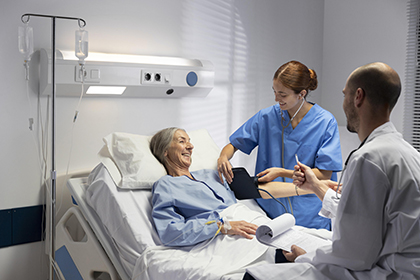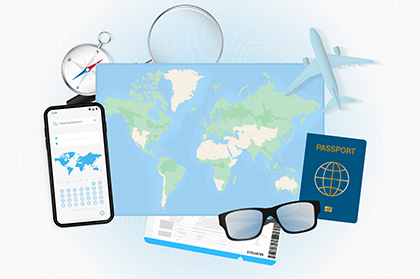Top Nursing Courses in Australia for International Students
Here are a few reasons WHY you should consider studying nursing and embark on your path to a successful career. Australia is...
Coral reefs, gorgeous sandy beaches, and some scary creatures come to mind when we think of Australia. However, there is a lot to learn about this small island nation. If you’re thinking about studying in Australia, you should learn about the culture, food, history, and social customs beforehand. Otherwise, you may find yourself in a messy situation or face some unpleasant shocks once you’ve arrived in this country.
Following the approval of your student visa permit, you should make post-visa arrangements, such as booking airline tickets, purchasing any necessary products while overseas, and carrying all appropriate immigration documentation and you’ll still have many more things to do.
To make yourself familiar and more comfortable when you first arrive, you need to know about the country of Australia, its people, weather, socio-economy, and others. Here, we discuss some aspects an international student needs to know before landing in Australia.
Ensure you have a place to stay before you arrive in Australia. You can also arrange for an airport pickup if necessary. After you’ve found a place to stay, you can then focus on other things like starting college or university classes, getting a bank account, making new friends, and other essentials for your stay and study comfort.
A list of contact details from family, relatives, friends, or even volunteers willing to help international students arriving in Australia for the first time can be of great help. These emergency contacts can help you during unforeseen circumstances in a new unknown country.
Your passport needs to be valid for at least the next 6 months as you arrive in Australia. Also, you need a valid visa to enter and study in Australia. You should have all your Visa papers with you before boarding the airplane.
Carry all your essential documents like offer letter, Confirmation of Enrolment (CoE), academic transcripts from previous studies, identification documents, important contact numbers, details of pre-arranged housing, and critical medical records. It is so because sometimes you may be required to provide original copies of your documents.
Carry a digital proof (with QR code) of your COVID-19 Vaccination certificate. The Australian Government has approved 8 immunizations for non-Australians residing abroad. Covishield (AstraZeneca), Jannsen, Covaxin, BBIBP-Corv Sinovac, Pfizer, Moderna Spikevax, and AstraZeneca (Vaxzevria). Students must travel to Australia within 7 days of getting the COVID-19 vaccine and they are required to carry a negative COVID-19 PCR report taken 3 days before departing.
The Digital Passenger Declaration (DPD) has replaced the Australia Travel Declaration web-based form. Since February 18th, 2022, travellers are required to provide Digital Passenger Declaration when they check-in for their flights.
Travelers can begin Digital Passenger Declaration up to 7 days before their flight to Australia. However, Travelers can only submit it within 72 hours of their departure. You can get updated information from the link. (https://www.homeaffairs.gov.au/covid19/digital-passenger-declaration)
Carry some cash with you when you arrive in Australia. The dollar is the fundamental unit of Australian money (i.e., the Australian Dollar). 1 AUD is equal to 100 cents. Currency notes are available in the denominations of AUD 5, AUD 10, AUD 20, AUD 50, and AUD 100 dollars. Coins are available for 5 cents, 10 cents, 20 cents, 50 cents, AUD 1, and AUD 2.
A student visa to be granted requires that you have and maintain Overseas Student Health Cover (OSHC) for the period of your stay in Australia. Make sure you have your health insurance in place before you go out. Your agent or University can help you with this.
International students are allowed to work while on a student visa in Australia. This helps students to earn some money to aid their living expenses and University fees. Moreover, Part-time jobs enable students to boost their confidence, communication skills, and social circle.
Students are allowed to work in Australia for 40 hours fortnightly but they should well balance their studies, career, personal well-being, and the job.
When arriving in Australia, your luggage should not exceed 158 cm in linear dimension and your total weight should not exceed 20-25 kg. But this condition differentiates depending upon the flight. You are allowed to carry one handbag weighing not more than 10 kg and the rest luggage should be checked in and should not exceed 20-25 kg weight.
International students should know to cook the basics like dal, rice, and vegetables. Carry a 3 to 7 liters pressure cooker and some spices. Most of the essentials are available in marts like Woolworths and Coles in Australia.
Cities like Sydney and Melbourne regularly rank in the top 10 list of the most expensive cities in the world. Everything ranging from housing to groceries is expensive compared to that in Nepal.
The average living cost in Australia for international students ranges anywhere from 1500 AUD to 2500 AUD a month.
As an international student in Australia, you’re going to get Australian grades. it’s a good idea to learn what they mean. A “D” is actually a rather respectable grade! The grading system used by most Australian institutions is HD (High Distinction), D (Distinction), C (Credit), P (Pass), and F (Fail). Don’t be alarmed if you earn your first “D”!
There’s a possibility you’ll need to hire/ buy a car when you’re in Australia. To begin, you should be aware that Australians drive on the left side of the road. Keep an eye out for traffic cameras. Also, avoid driving at dawn or dusk because kangaroos are everywhere in the early morning, late evening, and even at night, and they are much more difficult to spot.
It is always a good idea to learn and know about a place before you actually go there. It can save you time and money but moreover, it keeps you from encountering hard circumstances.
The above details are a very handful for international including Nepalese students intending or already in the process to study in Australia. For more details regarding travelling to Australia, Vevs Global Nepal provide accurate and exact Pre-departure Briefing for all Nepalese Students who are ready to travel to Australia.
Read blogs about all aspects of living, studying and working in Australia.

Here are a few reasons WHY you should consider studying nursing and embark on your path to a successful career. Australia is...

What is the best way to receive an Australian PR from Nepal? If you are considering permanent residency in another nation from...

If you're thinking about applying for a PR (Permanent residency) in Australia, don't give up. It's a fantastic idea for your future....

Travel to Australia from Nepal Coral reefs, gorgeous sandy beaches, and some scary creatures come to mind when we think of Australia....